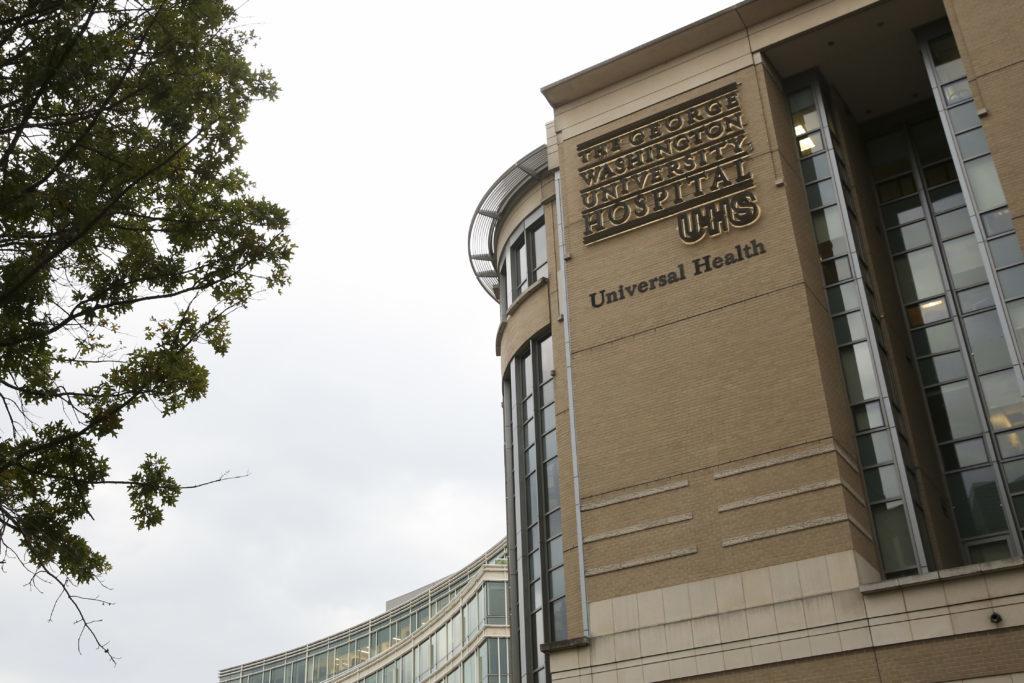Updated: September 7, 2017 at 8:04 p.m.
As a neighborhood group prepares to vote on GW Hospital’s helipad proposal, community members and students are divided on whether helicopters in the area would save lives – or put them at risk.
The Foggy Bottom and West End Advisory Neighborhood Commission will vote on an agreement with the hospital at a special meeting at St. Mary’s Court on 24th Street Thursday that, if passed, could clear the way for the helipad to be constructed. If the ANC votes it down, the D.C. Council could still step in to allow the project to move forward, but council members would be required to consider the ANC’s vote on the project, community leaders said.
Supporters of the helipad praised the project as a way to improve the city’s ability to transport critically injured patients, which can be vital during a disaster. But many residents of the surrounding neighborhood have raised concerns about noise and safety and claimed that GW Hospital has not given enough details about how many lives a helipad would save and why the current ambulance system is not sufficient.
Eve Zhurbinskiy, a senior and an ANC commissioner who plans to vote for the proposal, said unlike most decisions where there is broad agreement between commissioners, she expect’s Thursday’s vote to be a nail-biter.
“I think like three minutes of noise at a lower level with an ambulance per week is definitely a very negligible price to pay for potentially saving someone’s life,” she said.
Under the agreement, GW Hospital would limit the number of flights to 175 each year and prevent helicopters from idling on the roof except in extreme cases, according to a draft of the agreement, a copy of which was obtained by The Hatchet.
For construction of the helipad to begin, the D.C. Council would have to repeal a 1987 law banning the building of additional helipads in residential areas. An amendment to change that law was proposed last year but has since stalled.
“I’m not against helipads. I’m just against the idea – this notion that this is the right place for it.”
Zhurbinskiy said Ward 2 Council member Jack Evans indicated that he would strongly consider the ANC’s decision Thursday if a vote to repeal the law reaches the Council.
Meanwhile, opponents of the project are lobbying commissioners, Mayor Muriel Bowser and the D.C. Council to keep the law in place, community leaders said.
Denise Vogt, an I Street homeowner who has collected 14 letters from neighbors opposing the helipad and urged residents to attend the meeting, said with a rising population in the city, D.C. should keep its ban against helipads in residential areas.
“I’m not against helipads,” she said. “I’m just against the idea – this notion that this is the right place for it.”
At previous community meetings, Babak Sarani, the director of trauma and acute care surgery at the hospital, told residents that having a helipad would shave potentially life-saving minutes off the trip to the hospital for a trauma patient.
Currently, if a patient needs to be airlifted to the hospital, they are brought to a heliport in Southeast near Nationals Park and have to be transported across the city – often through heavy traffic – by ambulance, he said at a meeting. Sarani did not return multiple requests for comment.
Joe Florio, the communications director for Evans, said the council member was not available to comment before the vote.
Georgetown University Hospital, Sibley Memorial Hospital, MedStar Washington Hospital Center and the Children’s National Medical Center all have landing stations for helipads in the District. But GW Hospital is one of two level 1 trauma centers, the highest trauma care ranking, without a helipad in the city, according to the American College of Surgeons.
Some neighbors said they were worried noise from helicopters taking off and landing would rattle the area, and others said low-flying helicopters over downtown D.C. could put the area in danger of crashes and other safety mishaps.
Doug Hansen, a resident and alumnus, said the hospital towers above a Metro station, which is usually a bustling and densely populated area, and that he was concerned the propellers could generate wind that could throw objects onto the streets below.
“Our GW community has a moral obligation to support this critical proposal.”
“You’ve got the traffic coming up and down during all hours of the day – 23rd Street, New Hampshire – so there’s no buffer if you will to these areas from the helipad,” he said.
In 2014, the Federal Aviation Administration required all helicopters to implement stricter safety procedures after seven air ambulance accidents claimed 19 lives between 2011 and 2013, according to the FAA website.
Between March 30 and April 5, microphones were placed on top of area buildings, including the Watergate complex and Varsity on K, measuring helicopter noise at 80 to 90 decibels – about the same as ambulance levels on the ground level.
The Student Association plans to release a statement in advance of the vote expressing its support for the project because it will help victims of a mass casualty event, according to Ezra Alltucker, the chief of staff to SA President Peak Sen Chua.
“Our GW community has a moral obligation to support this critical proposal,” the statement reads. “Saving lives is worth any cost.”
Alltucker said SA representatives will attend the meeting to show support.
“The slight potential prices to pay in terms of noise or vibrations are nothing in the face of the ability to save lives,” he said.
This post was updated to reflect the following correction:
The Hatchet incorrectly reported the location of Thursday’s vote. It will be held at St. Mary’s Court, not St. Mary’s Episcopal Church. We regret this error.





